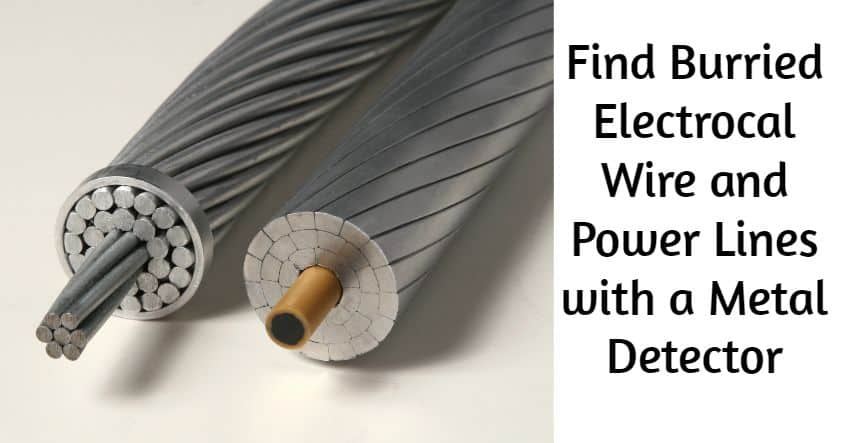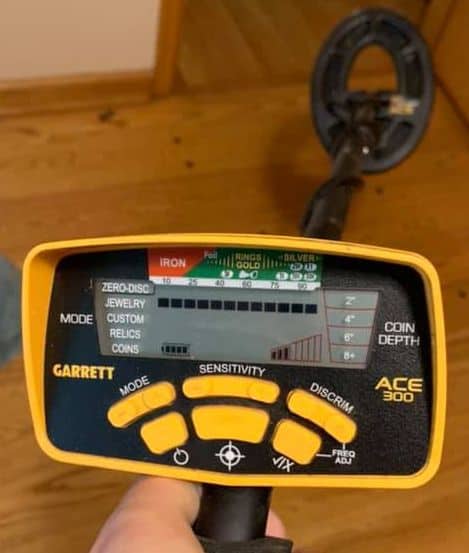
Probably you are looking for ways to locate a power line or a buried electrical wire precisely! This is a good idea, especially if you are planning on doing some word on the ground, this will prevent touching these power lines, so you won’t damage them …
… In this Quick Post, I give you some helpful insight on how to use a simple metal detector and locate power lines precisely!
First … Will a metal detector find power lines?
Yes, most metal detectors can detect power lines as well as far as they are not buried too deep underneath the ground.
The signal from the detection device is able to locate underground power lines by penetrating the plastic conduit and detecting the metallic wire present inside the power line.
In some cases, the conduit is made from metal, if that’s the case, then it becomes all the more easier to locate the power line.
What Metal Detector to use to find power lines or buried electrical wire?

The Garrett ACE 300 (Check it Here at Amazon) is an excellent detector for finding power lines. This lightweight machine has notch discrimination, five search modes, and many other features that help you look for power lines.
This VLF detector has an operating frequency of 6.5 kHz, which has just the right sensitivity level to locate your target.
The notch discrimination of this model allows you to filter out objects depending on the environment. This provides you with fine control over which items you want to be ignored and which signals to catch.
You can use the all-metal search mode of the Ace 250 to look for power lines. This mode will detect every type of metal and also ignore any discrimination setting.
What metals are power lines made of?
Power lines are typically made up of two materials, copper and aluminum wire with a steel core. Transmission lines are also made of the aluminum variety.
(These are actually the reason why power lines are easily detectable! In fact, aluminum and copper have enough electrical conductivity, especially copper, and this what makes your machine able to pick them up)
The reason behind this is that while copper works as a better conductor, and is stronger, but copper is too heavy and very expensive. In contrast to this, aluminum is also conductive and very light and cheap.
However, one downside to using aluminum is that it is a lot weaker than copper, which is where the steel core comes into play. The combination of aluminum and steel makes it a cost-effective and strong material to build power lines.
A newer type of aluminum conductor composite core cable, though, has a carbon and glass fiber core that is surrounded by an aluminum conductor. This allows less sagging of the wires between supports and is typically seen more on overhead power lines.
By the way, you can learn about how to detect aluminum here.
How to locate power lines properly?
Locating power lines today has become quite complicated because there are many telecommunication cables that are joining in with the utility lines in an underground environment.
Metal detectors for finding underground power lines work by injecting an electrical signal onto the cable being located.
In order to correctly locate power lines, the first step is to review a utility map of your area if it’s available…
…If there is no map available, then using a metal detector can help you trace out a power line. However, you need to be careful before you start digging to ensure that no telecom or and gas pipelines are running underneath.
You don’t want to cause any damage to these cables.
What other tools you will need?
There other tools that you might need to make your task easier, some of these tools include:
- Shovel (Check it Here at Amazon): I don’t advice you, under any circumstances, to use your hands digging. This could be quite risky! Using a solid shovel is necessary in my humble opinion.
- Pinpointer: This is also a kind of metal detectors, it is very small and will allow you to locate a metallic target more precisely once your regular detector gives a given signal.
- Cut Proof Gloves: For protection purposes, I highly encourage you to use proper gloves.
Conclusion
I didn’t want to make this Post too long, I found it to be better to give you some ideas and general guidelines on how to locate power lines as quickly and precisely as possible …
… Hope that was helpful!
Finally, if you are interested in this hobby, then I highly invite you to have a look at this metal detecting Guide for Beginners! I am sure you will learn lot of new stuff!
